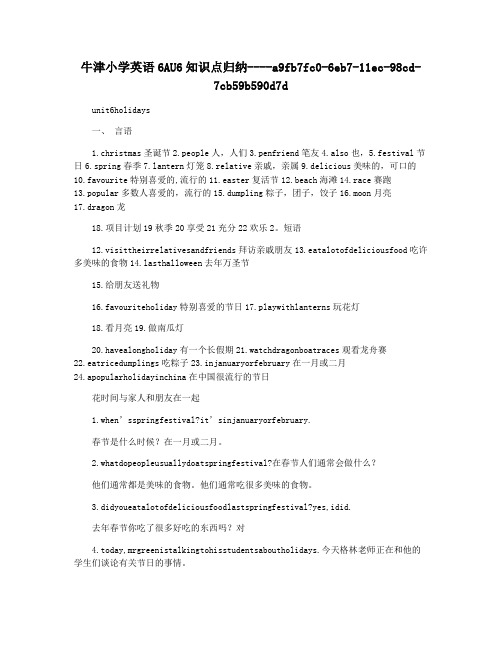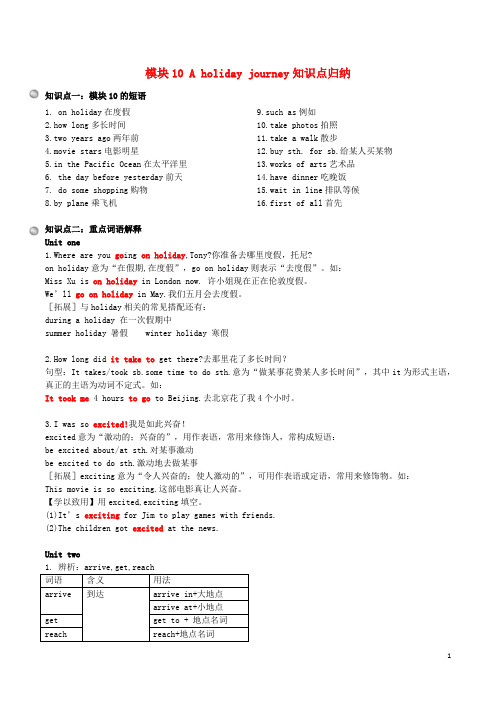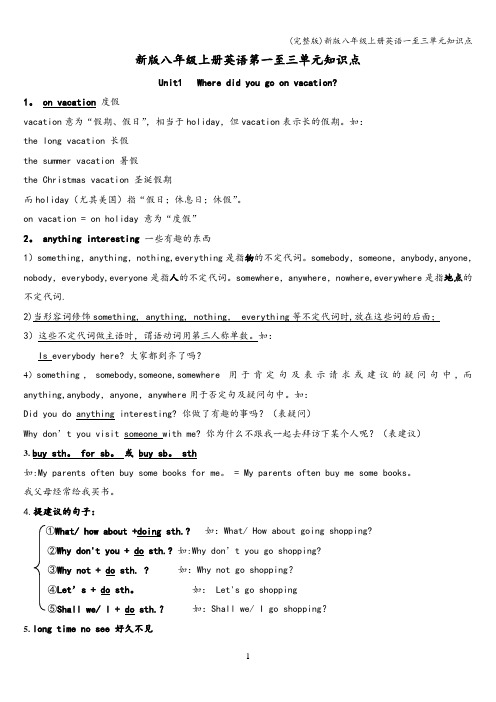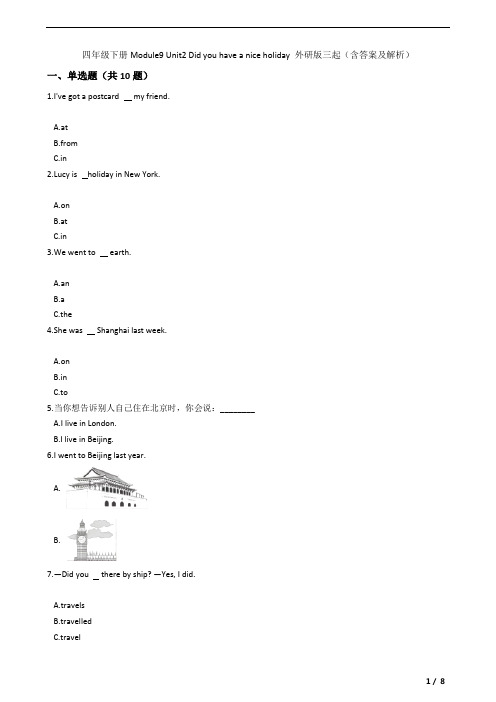in holiday 和 on holiday的区别
牛津小学英语6AU6知识点归纳

牛津小学英语6AU6知识点归纳----a9fb7fc0-6eb7-11ec-98cd-7cb59b590d7dunit6holidays一、言语1.christmas圣诞节2.people人,人们3.penfriend笔友4.also也,5.festival节日6.spring春季ntern灯笼8.relative亲戚,亲属9.delicious美味的,可口的10.favourite特别喜爱的,流行的11.easter复活节12.beach海滩14.race赛跑13.popular多数人喜爱的,流行的15.dumpling粽子,团子,饺子16.moon月亮17.dragon龙18.项目计划19秋季20享受21充分22欢乐2。
短语12.visittheirrelativesandfriends拜访亲戚朋友13.eatalotofdeliciousfood吃许多美味的食物sthalloween去年万圣节15.给朋友送礼物16.favouriteholiday特别喜爱的节日17.playwithlanterns玩花灯18.看月亮19.做南瓜灯20.havealongholiday有一个长假期21.watchdragonboatraces观看龙舟赛22.eatricedumplings吃粽子23.injanuaryorfebruary在一月或二月24.apopularholidayinchina在中国很流行的节日花时间与家人和朋友在一起1.when’sspringfestival?it’sinjanuaryorfebruary.春节是什么时候?在一月或二月。
2.whatdopeopleusuallydoatspringfestival?在春节人们通常会做什么?他们通常都是美味的食物。
他们通常吃很多美味的食物。
3.didyoueatalotofdeliciousfoodlastspringfestival?yes,idid.去年春节你吃了很多好吃的东西吗?对4.today,mrgreenistalkingtohisstudentsaboutholidays.今天格林老师正在和他的学生们谈论有关节日的事情。
义务教育六三学制七年级英语下册Module10Aholidayjourney知识点归纳90

模块10 A holiday journey知识点归纳知识点一:模块10的短语1. on holiday在度假2.how long多长时间3.two years ago两年前4.movie stars电影明星5.in the Pacific Ocean在太平洋里6. the day before yesterday前天7. do some shopping购物8.by plane乘飞机9.such as例如10.take photos拍照11.take a walk散步12.buy sth. for sb.给某人买某物13.works of arts艺术品14.have dinner吃晚饭15.wait in line排队等候16.first of all首先知识点二:重点词语解释Unit one1.Where are you go ing on holiday,Tony?你准备去哪里度假,托尼?on holiday意为“在假期,在度假”,go on holiday则表示“去度假”。
如:Miss Xu is on holiday in London now. 许小姐现在正在伦敦度假。
We’ll go on holiday in May.我们五月会去度假。
[拓展]与holiday相关的常见搭配还有:during a holiday 在一次假期中summer holiday 暑假 winter holiday 寒假2.How long did it take to get there?去那里花了多长时间?句型:It takes/took sb.some time to do sth.意为“做某事花费某人多长时间”,其中it为形式主语,真正的主语为动词不定式。
如:It took me 4 hours to go to Beijing.去北京花了我4个小时。
3.I was so excited!我是如此兴奋!excited意为“激动的;兴奋的”,用作表语,常用来修饰人,常构成短语:be excited about/at sth.对某事激动be excited to do sth.激动地去做某事[拓展]exciting意为“令人兴奋的;使人激动的”,可用作表语或定语,常用来修饰物。
(完整)外研社小学英语一起三年级下重点词汇及句子

外研社一起三年级下册重点短语及句子M1a bit 一点make an e-card / make e-cards 制作电子贺卡(注意单数时要有冠词an)do one’s Maths/ English/ Chinese/ Science做数学/语文/英语/科学作业1. This is Maomao. She’s very nice. 这是猫猫,她很善良。
(nice可以用别的形容词替换)2. She always helps people. 她总是帮助人们。
(注意时态,动词要有变化)3. He can make e-cards. 他会做电子贺卡。
(情态动词can后面+动词原形)4. But he’s a bit shy. 但是他有一点害羞5. I’ve got another friend. 我有另一个朋友6. I’m helpful. 我很有帮助7. This girl can’t do her Maths. 这个女孩不会做数学8. I’m going to help her. / He’s going to help you. 我将要帮助她。
(不同的主语对应不同的be动词)9. What’s ten plus/and eleven? It’s twenty-one.10+11等于多少?等于2110. And one more? 再加1?(one可以换成其他数字)11. This boy will cry. 这个小男孩要哭了M2Big BenTower BridgeGreen Park / Red Park****注意,有的景点前面由the,有的没有the River Thamesthe London Eyehigh up in the sky 高挂在天空1. It’s about London. 它是关于伦敦的2. I’m from London.我来自伦敦。
(London 可以被任何城市名、国家名替换)3. This river is very wide. And it’s very long.这条河很宽,也很长。
(完整版)新版八年级上册英语一至三单元知识点

新版八年级上册英语第一至三单元知识点Unit1 Where did you go on vacation?1。
on vacation度假vacation意为“假期、假日”,相当于holiday,但vacation表示长的假期。
如:the long vacation 长假the summer vacation 暑假the Christmas vacation 圣诞假期而holiday(尤其美国)指“假日;休息日;休假”。
on vacation = on holiday 意为“度假”2。
anything interesting 一些有趣的东西1)something,anything,nothing,everything是指物的不定代词。
somebody,someone,anybody,anyone,nobody,everybody,everyone是指人的不定代词。
somewhere,anywhere,nowhere,everywhere是指地点的不定代词.2)当形容词修饰something, anything, nothing, everything等不定代词时,放在这些词的后面;3)这些不定代词做主语时,谓语动词用第三人称单数。
如:Is everybody here? 大家都到齐了吗?4)something,somebody,someone,somewhere用于肯定句及表示请求或建议的疑问句中,而anything,anybody,anyone,anywhere用于否定句及疑问句中。
如:Did you do anything interesting? 你做了有趣的事吗?(表疑问)Why don’t you visit someone with me? 你为什么不跟我一起去拜访下某个人呢?(表建议)3.buy sth。
for sb。
或 buy sb。
sth如:My parents often buy some books for me。
外研版三起四年级英语下册Module9 Unit2 Did you have a nice holiday试卷(含答案及解析)

四年级下册Module9 Unit2 Did you have a nice holiday 外研版三起(含答案及解析)一、单选题(共10题)1.I've got a postcard my friend.A.atB.fromC.in2.Lucy is holiday in New York.A.onB.atC.in3.We went to earth.A.anB.aC.the4.She was Shanghai last week.A.onB.inC.to5.当你想告诉别人自己住在北京时,你会说:________A.I live in London.B.I live in Beijing.6.I went to Beijing last year.A.B.7.—Did you there by ship? —Yes, I did.A.travelsB.travelledC.travel8.当别人问你昨天怎么去的杭州时,你可以回答:________A.I went to Hangzhou by plane yesterday.B.I go to Hangzhou by plane today.9.—Did you visit the famous West Lake? —Yes, we did.A.B.10.They went to a concert last Sunday.A.B.二、填空题(共2题)11.为下列图片找到正确的英文,将序号填在横线上⒈lots of people ⒉some funny animals⒊have a nice holiday ⒋the Great Wall⒌go to a concert________________________________________12.为下列句子找出对应的答语A. Yes, she does.B. Yes, I did. It was great.C. No, he didn’t. He lived in San Francisco.D. No, she didn’t. She came by train.E. Yes, he does.(1)Did you have a nice holiday?(2)Did he live in New York?(3)Does he live in Beijing?(4)Did she come by plane?(5)Does Amy live in London?三、选词填空(词汇运用)(共5题)13. ________(Does,Did) she live in Beijing last week?14.—Did he visit San Francisco?—Yes, he ________(does,did).15.Did you ________ (come,came) by train?16.Look! It ________(is,was) a postcard from Tianjin.17.We ________ (went,go) to a concert last week.四、单词拼写(词汇运用)(共1题)18.看图补全单词。
on和in的用法

on和in的用法
在英语中,“on”和“in”是常用的介词,它们的用法非常灵活,具体取决于所描述的情境和上下文。
以下是一些基本的用法说明:on的用法:
1.表示在某物体的表面或上方。
例如:The book is on the table.(书在桌子上。
)
2.表示在某一天或某一天的某个时段。
例如:I have a meeting on Tuesday.(我星期二有个会议。
)
3.表示在某种状态或进行中。
例如:She is on holiday.(她在度假。
)
in的用法:
1.表示在某个空间或范围内。
例如:She is in the room.(她在房间里。
)
2.表示在一段时间的过程中。
例如:I will be in China for two weeks.(我将在中国待两周。
)
3.表示在某种语言、材料或领域中。
例如:He is an expert in computer science.(他是计算机科学方面的专家。
)
需要注意的是,“on”和“in”的具体用法可能会因上下文、语境和习惯用法而有所不同。
因此,在实际使用中,需要根据具体情况来判断使用哪个介词。
同时,也需要注意介词与其他词类的搭配使用,以避免出现语法错误或歧义。
holiday、vacation、leave、off用法区别
holiday、vacation、leave、off用法区别这四个词都有表示“假期”的意思,但具体含义有所不同。
holiday n. 一般表示时间可长可短的假期,为可数名词。
与季节连用时多用复数;与数词连用时只表示次数,不表示日期。
例如:We have had three holidays since the beginning of the year.但三天的假期应说:a holiday of three days或a three days’ holiday。
vacation n. 一般表示比较长的假期,多指大学的假期、法庭的休庭期。
至于寒、暑假,英国人喜欢用:summer/winter holidays,美国人喜欢用:summer/winter vacation,区别不大。
例如:We spent our summer holidays/vacation in the countryside this year.My Dad is now on holiday/vacation in Beijing.(表示状态)Every year, we go to the island for holiday/vacation.(表示目的)(holiday/vacation用单数,前面也不加冠词,但可用on/for one’s holidays) vacation v 休假;n (地方的)腾出、(职位的)辞去,例如:Let’s vacation in Hawaii next month. (《英汉多功能词典》外研社/建宏出版社) The vacation of the house was demanded. (《当代英语搭配词典》现代出版社) leave n. 多指政府部门、机关、事业单位、部队等的休假。
常用的短语ask for leave for three days意思为:请三天假。
例如:The worker asked for leave for two days to see a doctor.off adv. 表示休假、不工作、不上班,多用于名词后作定语,例如:The teacher will give me five days off.I requested two minutes off during the meeting.练习:用holiday/vacation/leave/off填空:1.Christmas is an important ___________ for everyone in the West.2.The students are now on ____________ in the south of China.3.We will spend our winter ____________ in a few days’ time.4.You had better ask the teacher for two days’ ___________ .5.The boss gave the worker two days ____________ .6.His __________ of a good position in the Civil Service was unwise.Key: 1.holidays/holiday 2.holiday/vacation 3.holidays/vacation 4.leave 5.off 6.vacation。
on holiday 还是on holidays_用法辨析 英语语法.doc
on holiday 还是on holidays_用法辨析到底是on holiday 还是on holidays?其中的holiday 到底该用单数还得复数?_________ the railways put on special trains.A. In holidayB. On holidayC. In holidaysD. On holidays现分析如下:大家知道,on holiday是习语,意为在休假,该短语通常用介词on 而不用in,且其中的holiday 通常不用复数,且其中也不用冠词,但有时可用物主代词(此时可用复数,即on one’s holidays)。
基于此认识,许多同学便选了B。
其实此题最佳答案为D,on holiday 和on holidays 均可用说,只是含义不同:1. 短语on holiday,可用作表语或状语,其中通常不用冠词,但有时可用物主代词。
如:I’ll be on holiday next month. 我下个月全月休假。
The typist is away on holiday this week. 打字员本周休假。
I met a lot of interesting people on holiday. 我度假时碰到很多有趣的人。
We’re touring Italy on our holiday. 我们正在意大利观光度假。
They are on their holiday in Paris. 他们在巴黎度假。
It’s costing me a small fortune to send children on holiday. 送孩子们度假花了我一大笔钱。
Where to go on holiday is always a bone of contention in our family. 到哪去度假总是引起家里的争执。
We are short of funds at the moment, so we are not going on holiday. 眼下我们缺钱,所以不去度假了。
in、on、at的时间用法和地点用法(史上最全版)
i n,o n,a t的时间用法和地点用法一、in,on,at的时间用法1、固定短语:inthemorning/afternoon/evening在早晨/下午/傍晚,atnoon/night在中午/夜晚,(不强调范围,强调的话用duringthenight)earlyinthemorning=intheearlymorning在大清早,lateatnight在深夜ontheweekend在周末(英式用attheweekend在周末,atweekends每逢周末)onweekdays/weekends在工作日/周末,onschooldays/nights在上学日/上学的当天晚上,2、不加介词this,that,last,next,every,one,yesterday,today,tomorrow,tonight,all,most等之前一般不加介词。
如,thismorning今天早晨(on)thatday在那天(thatday更常用些)lastweek上周nextyear明年thenextmonth第二个月(以过去为起点的第二个月,nextmonth以现在为起点的下个月)everyday每天onemorning一天早晨yesterdayafternoon昨天下午tomorrowmorning明天早晨allday/morning/night整天/整个早晨/整晚(等于thewholeday/morning/night)mostofthetime(在)大多数时间3、一般规则除了前两点特殊用法之外,其他≤一天,用on,>一天用in,在具体时刻或在某时用at(不强调时间范围)关于onOn指时间表示:1)具体的时日和一个特定的时间,如某日,某节日,星期几等。
Hewillcometomeetusonourarrival.OnMay4th(OnSunday,OnNewYear’sday,OnChristmasDay),therewillbeacelebration. 2)在某个特定的早晨,下午或晚上。
[说明]in,on和at表示时间、地点和状态的用法区别和常用短语
at, in , on, 和by 表示时间的区别:at指时间表示:1)时间的一点,一时刻:They come home at surprise (at noon, at midnight, at ten o’clock, at daybreak, at dawn).2) 较短的一段时间。
可指某个节日或认为一年中标志大事的日子。
His grandfather died at seventy-two.At the beginning (middle, end) of that month he was sick.He went home at Christmas (at New Year, at the spring Festival, at night, at midsummer).In指时间表示:1)在某个较长的时间(如世纪,朝代,年,月,季节,及泛指的上午,下午和晚上等)内。
He died in the holidays.He was born in 1942.2) 在一段时间之后。
He will come round in a day or two.I will finish it in three hours.On指时间表示:1)具体的时日和一个特定的时间,如某日,某节日,星期几等。
He will come to meet us on our arrival.On May 4th (On Sunday, On New Year’s day, On Christmas Day), there will bea celebration.2) 在某个特定的早晨,下午或晚上。
He arrived at 10 o’clock on the night of the 5th.He died on the eve of victory.3) 准时,按时。
If the rain should be on time, I should reach home before dark.表示地点的区别In 表示地点1) In 表示比较大的地方,2)虽然是很小的地方,如果说话人住在那里,也可用in.商店,机关,学校等,若看作一个地点(point)用at,若看作一个场所(place)用in.I met him at the post-office.I’m now working in the post-office.On表示地点,一般指与面或线接触:1)“在…上面”He put the book on the table and sat on the chair.The picture was hanging on the wall.2) “在…… 旁边”New work is on the Hudson River.Xiamen is on the river.He lives in a house on the river.1). near, by, beside, at表示“在•••••••附近”的区别:near 表示相对的“近”,实际距离可能还很远。
- 1、下载文档前请自行甄别文档内容的完整性,平台不提供额外的编辑、内容补充、找答案等附加服务。
- 2、"仅部分预览"的文档,不可在线预览部分如存在完整性等问题,可反馈申请退款(可完整预览的文档不适用该条件!)。
- 3、如文档侵犯您的权益,请联系客服反馈,我们会尽快为您处理(人工客服工作时间:9:00-18:30)。
in holiday 和on holiday的区别
in holiday 泛指放假,但说话人说话的时候并不在放假。
如,i'd like to stay with my families in holiday.
In the holiday 指特定的假期,根据上文的延续。
如,Christmas is a special holiday in western countries. In the holiday, people usually stay with their families.
On holiday 处于放假的状态
如,i'm on holiday now.类似有on duty 上班中
帮你造了几句话,你可以通过理解句意来看区别,希望对你有用
On the holiday:
A few more traveller's cheques may come in handy on the holiday.
多带几张旅行支票,度假时会有用的。
In the holiday:
We (enjoy ourselves) in the holidays.
In the holiday season one finds the trains unpleasantly full of people. 节日期间,人们可以看到火车上拥挤不堪,人满为患。
如果你前面曾经提起过某个节日,而现在针对这个节日说on,就要用on the holiday,特指在这个节日。
否则,用on holiday.。
